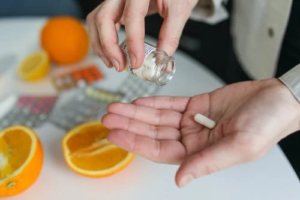
When you’re a parent, it’s the absolute last thing that you want to see your child go through. You’d do anything in your power to keep them happy and healthy at all times. However, getting kids to eat right is no easy task, but there are some great supplements out there that can help ensure they get what their body needs while still maintaining their health.
Probiotics
Probiotics are the best friend of your child’s gut. If you take care of them well, they’ll take care of you well. Gut health is extremely important for your child’s immune system, especially when they’re sick. Having the right bacteria in their stomach will help aid in digesting food better, absorbing nutrients into the body better, and could even improve their mood! Giving your child a probiotic supplement can help to support a healthy digestive system as well as boost their immune system. They come in both pill and powder forms and are usually taken once or twice a day. Look for probiotics that have a high CFU count to make sure your child is getting the most benefit from them.
Biotin
Biotin is a water-soluble vitamin that is necessary for the body to break down and use food sources of carbohydrates, protein, and fat. It is also necessary for the body to produce glucose, which is used for energy. Biotin is also important in the formation of fatty acids and cholesterol. In addition, biotin helps keep the skin, hair, and nails healthy. Biotin can be found in many foods including eggs, nuts, seeds, and whole grains. However, if a person’s diet does not include enough of these foods, then they may need to take a biotin supplement. Supplements like Biotin can be incredibly helpful for children who struggle with brittle nails or hair loss. They come in easy-to-swallow tablets using natural ingredients like zinc and copper sulfate along with other special plant extracts which make them quick and simple to add into their daily routine.
Omega-3 Fatty Acids

Omega-3 fatty acids are important for the body in many ways. They help keep the heart healthy by lowering bad cholesterol levels and preventing blood clots. They are also beneficial for brain health and can improve cognitive function. Omega-3 fatty acids can be found in oily cold-water fish such as salmon, trout, and herring. However, if a person does not eat enough oily cold-water fish, then they may need to take an omega-3 fatty acid supplement. Omega-3 fatty acids are essential for growing children and can be found in fish oil supplements. They play an important role in brain development and function, as well as helping to keep good heart health. Omega-3 fatty acids can also be helpful in reducing inflammation throughout the body. Look for supplements that have been tested by an independent third party to ensure they are safe for your child.
Calcium
Calcium is a mineral that is necessary for strong bones and teeth. It is also important in the contraction of muscles and nerve signaling. Calcium is found in many dairy products such as milk, yogurt, and cheese. However, there are other great sources of calcium including dark leafy greens such as spinach and kale, tofu made with calcium sulfate, blackstrap molasses, and sardines with bones. If a person does not get enough calcium from their diet, then they may need to take a calcium supplement. Ask a pediatric dentist to know how much your child should intake.
Vitamin D
Vitamin D is a fat-soluble vitamin that is essential for human health. It is produced by the body when UV rays from the sun hit the skin. Vitamin D is necessary for the absorption of calcium and helps maintain bone health. Children who are deficient in vitamin D are more likely to get sick and have weaker bones. Supplementing with vitamin D can help prevent these problems. Buy a Vitamin D level test kit online to conveniently check your kid’s Vitamin D levels at home, check out Vitamin D test kit price at biohithealthcare.co.uk.
Iron
Iron is an important mineral that the body needs for making hemoglobin, which carries oxygen in red blood cells throughout the body. If a person does not get enough iron in his or her diet, then he/she may become anemic, which can cause fatigue and other health problems. Good food sources of iron include meat, poultry, fish, legumes, and fortified foods. However, if a person’s diet does not include enough of these foods, then they may need to take an iron supplement.
Vitamin C
Vitamin C is a water-soluble vitamin that is essential for human health. It is one of the most common nutrients in the human diet and can be found in both plant and animal sources. Vitamin C is a powerful antioxidant that helps protect the body from free radicals and helps heal wounds. It is also necessary for the development and maintenance of bones, teeth, and cart. Children who are deficient in vitamin C are more likely to get sick and may have difficulty healing from injuries.
Other supplements you may want to look into are magnesium, zinc, iron, and vitamin C. Each of these has its own benefits that may help your child’s development along in some way. Whether it’s building strong bones or improving their immune system, there is something out there for every kid!






